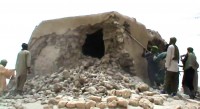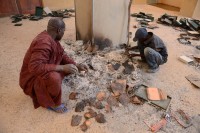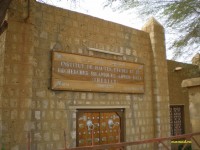I haven’t had the stomach to post about the sickening destruction of cultural heritage that has plagued Mali’s historic city of Timbuktu since it was occupied by the extremist Salafist Ansar Dine (Defenders of the Faith) group last spring. It’s been a nightmare, an orgy of demolition akin to the Taliban in Afghanistan, only these guys were targeting Islamic archaeological sites from a different denomination rather than Buddhist ones.
Located at a crossroads of trade, during the Middle Ages, Mali (in particular Timbuktu) was a center of scholarship, art and science, attracting the greatest intellects of the era from all over Africa. Sufi Islam was the dominant branch, and very much unlike today’s Salafist, it took an open-minded approach to pre-Islamic faiths and embraced the variety of cultures – Arabic, African, Berber, Tuareg – that mingled in the cosmopolitan country. Sufi luminaries were buried in mud-brick tombs which gave Timbuktu the moniker “the city of 333 saints.”
 Ansar Dine considers these Sufi shrines idolatrous. As part of its effort to impost strict Sharia law by force, as soon as they took over Timbuktu they started tearing the tombs apart with guns, shovels and pickaxes. At least eight of them were demolished or burned. When the world protested the destruction of these UNESCO World Heritage sites, Ansar Dine made a statement telling them exactly how much they gave a rat’s ass: “We are subject to religion and not to international opinion. Building on graves is contrary to Islam. We are destroying the mausoleums because it is ordained by our religion.”
Ansar Dine considers these Sufi shrines idolatrous. As part of its effort to impost strict Sharia law by force, as soon as they took over Timbuktu they started tearing the tombs apart with guns, shovels and pickaxes. At least eight of them were demolished or burned. When the world protested the destruction of these UNESCO World Heritage sites, Ansar Dine made a statement telling them exactly how much they gave a rat’s ass: “We are subject to religion and not to international opinion. Building on graves is contrary to Islam. We are destroying the mausoleums because it is ordained by our religion.”
There was a great fear that their next target would be the approximately 300,000 manuscripts in an old library building and in the newly built Ahmed Baba Centre for Documentation and Research in Timbuktu, a storied collection of manuscripts going back to the 12th century written in Arabic and African languages on every topic you can think of from astronomy to math to botany to geography to theology and ever so much more. Even though precious copies of the Koran and other one-of-a-kind Islamic manuscripts were kept in the library, the fate of the Sufi sites proved conclusively that religious scruples wouldn’t stop them from destroying that history either.
 When the French military operation to wrest northern Mali out of Ansar Dine’s control got close to Timbuktu at the end of January, it seemed like the library’s fate was sealed. Ansar Dine forces torched the Ahmed Baba Centre on their way out. News stories reported that hundreds of thousands of irreplaceable manuscripts were in ashes, an incalculable blow to the history of Timbuktu, Mali, Africa and the world.
When the French military operation to wrest northern Mali out of Ansar Dine’s control got close to Timbuktu at the end of January, it seemed like the library’s fate was sealed. Ansar Dine forces torched the Ahmed Baba Centre on their way out. News stories reported that hundreds of thousands of irreplaceable manuscripts were in ashes, an incalculable blow to the history of Timbuktu, Mali, Africa and the world.
It turns out, however, that the librarians and curators were too smart for those barbarians. By the time Ansar Dine beat their hasty and fiery retreat, most of the manuscripts were safely hidden away.
The two sources said that soon after Tuareg rebels swept into Timbuktu on April 1 in a revolt later hijacked by sharia-observing Islamist radicals, curators and collectors of the manuscripts had started hiding the texts away for safety.
“They shipped them out and distributed them around,” Jeppie said. The Malian source said the manuscripts were concealed “a little bit everywhere,” but he declined to give details.
It would not be the first time that Timbuktu’s inhabitants have had to protect their city’s manuscripts from intruders.
Some texts were stashed for generations under mud homes and in desert caves by families who feared they would be stolen by Moroccan invaders, European explorers and French colonialists.
 Considering that Ansar Dine enforcers went door-to-door to threaten Timbuktu residents that Sharia was now in effect, keeping their heritage safe and secret was an act of immense collective courage. This Wall Street Journal article has some more details about the cloak and dagger operations to save the precious manuscripts.
Considering that Ansar Dine enforcers went door-to-door to threaten Timbuktu residents that Sharia was now in effect, keeping their heritage safe and secret was an act of immense collective courage. This Wall Street Journal article has some more details about the cloak and dagger operations to save the precious manuscripts.
There are still some terrible losses. Many bills of sale and other documents from the slave trade were burned, and even the documents that were not burned are so fragile they’re bound to have been damaged by their hasty transportation.
UNESCO is planning to send a mission to document conditions and determine which crises require the most urgent attention. UNESCO Director-General Irina Bokova visited Mali on Saturday and met with Malian authorities and French President François Hollande who was also visiting. In collaboration with local experts and community leaders, UNESCO will help rebuild what was damaged and conserve endangered documents.